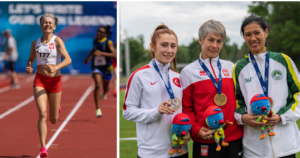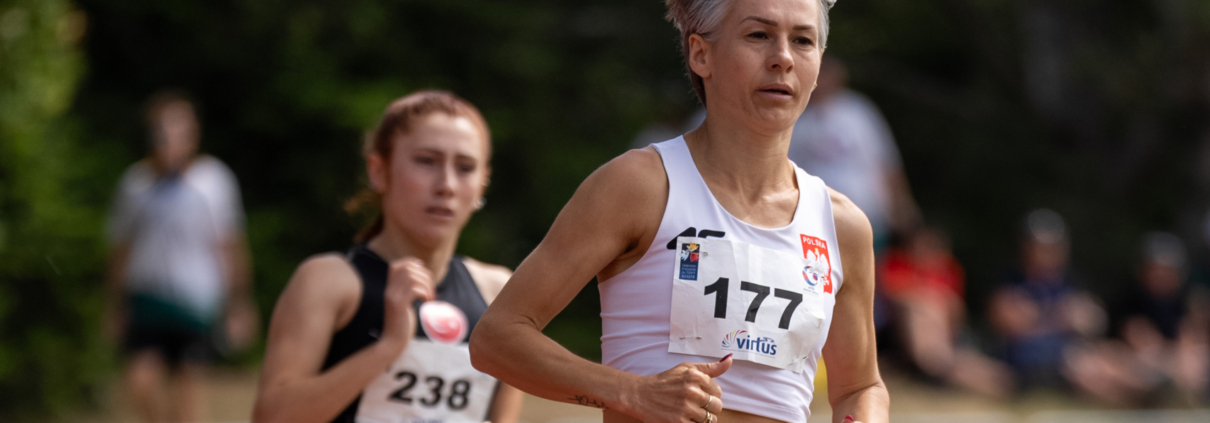Forty-Two-Year-Old Barbara Bieganowska-Zając Running To Win Her Fifth Paralympic Gold At Paris 2024
In the beautiful city of Frączków, Poland, resides a legend who won four Paralympic medals and multiple Virtus Global Games and WPA World Championship titles, Barbara Bieganowska-Zając. Also known as the ‘Golden Basia’, Barbara is preparing to win her fifth Paralympic gold medal at Paris 2024.
Barbara’s journey in sports began in her childhood. She was very active, everything interested her when she was a child. She got into initially through play, I started my adventure with athletics.”
Barbara Bieganowska-Zając is married to her supportive husband Piotr and is the proud mother of two beautiful young daughters, Wiktoria and Martyna. Her daughters are well aware of her accomplishments and take pride in having a world and Paralympic champion as their mother. Balancing her roles as an athlete and a mother, Barbara excels in both, thanks to the unwavering support from her husband and family. They create a peaceful and quiet environment for her to train, which she deeply values.
“My role as a mum I think I do very well—maybe not perfectly, but certainly very well. I share the roles perfectly as a mum, parent, and friend for my daughters. We get along well, support each other, and everything is okay.”
“My family is also very active in sports. They support me spiritually and athletically and are always with me when I have difficult days.”
Having lived a life with intellectual impairment, Barbara is keenly aware of the challenges faced by those with intellectual disabilities.
“My disability hinders me a lot in such activities. I have problems filling in forms or any kind of paperwork, and I even find it very difficult to work with the ADAMS system, which I have to run on a daily basis and fill in various fields. I am very happy to have a husband who is by my side and helps me with all this. I am very grateful to him for that.”
“In the beginning, everything in training was difficult for me because I was learning everything. And I am still learning. There are some workouts which are difficult for me, ones where I have to calculate times in continuous runs or speed stretches, where I need my coach’s help with that.”
“People like me are invisible at first sight, and people just don’t believe us. We face many problems daily. It is more difficult for us to get a sponsor like people with physical disabilities. For a lot of people, it’s hard to understand that a person like me, who has two arms and two legs and can see, has a disability and can’t cope in life. It’s not all quite as many people think.”
Barbara also mentioned facing trolls on social media due to her impairment. Despite the negative comments she received on social media early in her career, Barbara remains resilient.
“In the beginning, I had all sorts of comments on Instagram, Facebook, and other social media about my personality. But I’m the kind of person who doesn’t take negative things from other people to heart. These are the kind of people who don’t understand people with intellectual impairment. The problem I have always had, and I do my best to keep it as low-profile and rare as possible”

Barbara running 1500m at GG2023 (L) and on the podium with her fellow competitors (R). Photo Credit: Kellerman lens
Barbara’s passion for athletics is evident in her training routine.
“I work out from Monday to Saturday. I do them every day, systematically, and I break it up during the week so that I have the strength and time to do everything, but training always comes first.”
Reflecting on her career, Barbara mentioned how Virtus events like the Virtus Global Games, Virtus European Championships, and Virtus World Championships have played a significant role in her career.
“They certainly opened the way for me to the most important competition, the Paralympic Games, where I am competing.”
Barbara has won four gold and one bronze at previous Paralympic Games, seven gold, two silver and one bronze at the World Championship, six gold from Virtus Global Games and multiple medals from regional championships. When asked about her favourite medal amongst all those which she collected from various international event, she remembered the silver medal she won at an event in New Zealand.
“Probably my most memorable run was at a competition in New Zealand. During the 1500-meter run, right after the start, one of the athletes stepped on my heel and pulled off my shoe. At that moment, I was very scared. I stopped, put my shoe back on, almost sprinted to the running group, and kept running with the group, but unfortunately, I paid for it at the end and lost the gold medal, winning silver instead. That silver medal from the world championships in New Zealand stayed in my mind so much.“
Looking up to her fellow athlete Rafal Rak, who is preparing for the Olympic Games in Paris, Barbara finds inspiration.
“He is my role model today because, like me, he is running 1500 meters.”
As she prepares for the Paris 2024 Paralympic Games, she recognizes all athletes as her competitors.
“My goal is known: to go to the Paralympic Games. I have my goals, I have my dreams, and I am pursuing them. And my goal is to get the best possible place in Paris 2024.”
“We (all the athletes) are all strong and will be well prepared. We will all fight for the best place, and time will tell who will win.”
“My ultimate goal in life is to run, run, and run. I think I’m going to run as much as I have strength and health, and I’m definitely not going to stop at this Paralympic Games, which will be in Paris.”
She shares a message for young athletes with intellectual disabilities: “I would like to tell you, dear ones, not to give up. Fight, have your goals, and pursue them as I did.”
Barbara is grateful for campaigns that highlight the truth about people with intellectual disabilities.
“I am very happy with Virtus launching this campaign that shows the truth about people with intellectual impairment and shows how things really are and not how people sometimes think.”
Join Virtus’ #MakingInvisibleVISIBLE campaign in making Barbara’s journey Visible.
WHAT IS INTELLECTUAL IMPAIRMENT?
Intellectual impairment is an umbrella term to describe a vast and neuro-diverse group of people with varying types of cognitive impairments including intellectual disability, Down syndrome and autism. Having an intellectual impairment impacts how an athlete understands the rules of the sport, interacts with other players, and adjusts to different environments. They might find it difficult to manage reaction times, remember specific race or game strategies, retain focus for long period of time, or maintaining impulse control.




